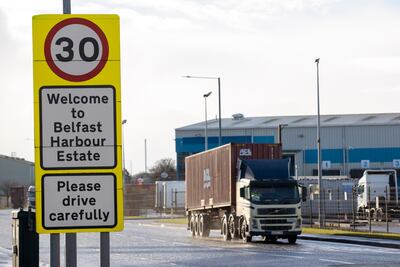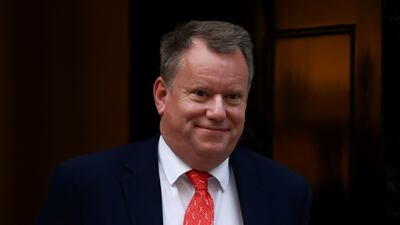The relative “weakness” of the UK's position in Brexit talks with the EU is to blame for the current problems with the Northern Ireland Protocol, Prime Minister Boris Johnson’s former chief negotiator has said.
Lord David Frost, the former Brexit minister who negotiated the withdrawal agreement, said the arrangements for Northern Ireland would only have worked if the EU’s regulatory framework had not been fully applied.
He said the EU's “purism” in the way it was implementing the protocol — such as requiring customs checks on goods moving from Great Britain to Northern Ireland — was now threatening the peace process.
Mr Frost made his comments in a foreword to a report by the centre-right Policy Exchange think tank which argued that the idea of an all-island Irish economy was a fiction that was being promoted for “political ends”.
The report by the Policy Exchange’s chief economic adviser Dr Graham Gudgin said that, despite the signing of the Good Friday Agreement in 1998, there was little integration between Northern Ireland and the Republic and that they remained “two distinct economies”.
Only 4 per cent of the goods and services produced in Northern Ireland cross the border to the Republic, while 16 per cent go to Great Britain, and 31 per cent of imports to Northern Ireland are from the rest of the UK, the report said.
At the same time, 2 per cent of the Republic’s exports go to Northern Ireland and 6 per cent of Northern Ireland’s imports come from the Republic.

Mr Frost said the idea of an “all-island economy” had effectively become part of the protocol because it chimed with the political ambitions of Brussels and Dublin, although it did not fit with the reality on the ground.
“Shaped as the protocol is by relative UK weakness and EU predominance in the withdrawal agreement negotiations, it enshrines a concept, the all-island economy, which suits the EU, Ireland, and their allies politically but which does not exist in real life,” he said.
“Hence the grinding tensions, the economic frictions, and the political turbulence caused by the protocol.
“Given this economic reality, the protocol arrangements could only have worked if, in real life, the EU regulatory framework had not been fully applied in practice (recognising, for example, the protocol’s requirement to minimise checks and controls at Northern Ireland ports) and there had been much more pragmatism in its operation.
“As it was, the EU’s purism and its casually destructive handling undermined East-West links from the start and are now bringing the Belfast (Good Friday) Agreement itself into great peril.”

In a second foreword to the report, the former Northern Ireland first minister Lord David Trimble, who was leader of the Ulster Unionist Party at the time of the Good Friday Agreement, said talk by the Irish government of an island economy was having a “destabilising effect”.
“At the time of the Good Friday Agreement, the Irish government did not talk to us about an island economy: they were looking for co-operation for mutual benefit,” he said.
“Today the Irish government has a different language in which the island economy is an endlessly repeated theme. The Irish government sharpens unionist fears that there is some all-island economic propulsion leading to political unity. This has had a destabilising effect.”
“Now is not the time for a blame game about the workings of the protocol,” said Labour’s shadow international trade secretary, Nick Thomas-Symonds.
“What is needed is a pragmatic way forward.
“Chaos in the Conservative Party should not be preventing ministers from getting around the table and carrying out the painstaking work necessary to find a solution, and the EU should engage in a pragmatic spirit.”


